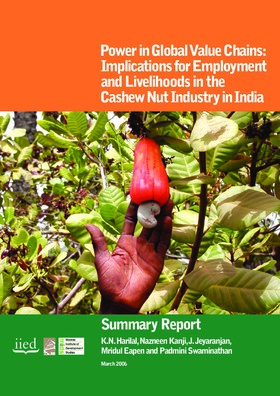Power in Global Value Chains: Implications for employment and livelihoods in the cashew nut industry in India

Power in Global Value Chains:Implications for Employment and Livelihoods in the Cashew Nut Industry in India explores the impacts of an expanding global market for cashew nuts on the livelihoods of women workers in the cashew processing industry. This report shows that a power imbalance between intensely competing producers and relatively few buyers in the global market place gives large retailers, the supermarkets, the upper hand over their supply chains. Supermarkets are increasingly able to dictate the terms on which business is done and how the cashew is produced, as well as to capture most of the revenue generated along the chain. Our survey of the women workers who process the cashew nuts shows clearly that such work, while essential for survival, does not provide enough income to raise households out of poverty. The increasing informalisation of employment in the sector creates insecure and hazardous working conditions. This research is a good example of how international trade too often fails to provide the kind of economic growth which will foster secure and equitable employment and enable the working poor to escape from poverty.
Cite this publication
Available at https://www.iied.org/14514iied